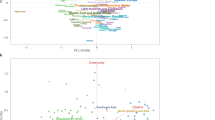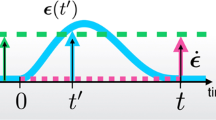Abstract
VECTOR analysis is now recognised fully as furnishing standard modes of expression for many ranges mathematical and physical thought; and meanwhile, the atmosphere of the physical thought especially is continually reacting upon the newer analytic method, and adapting it with preciser discrimination the needs of actual use. Thus the dichotomous arrangement of quantities as scalar or vector been supplemented by the tensor-triplet as a tertium quid, vectors are habitually grouped as free or localised, pseudo-scalars have been set off from pure scalars. Something has been done, too, through influence of ascertained physical connections, toward unifying discrete formal results by appreciating real underlying articulation. Such advances as are made deserve immediate incorporation in the accepted text, likely to render the methods more widely available; and the serving of that end has suggested presenting the notes that follow.
Similar content being viewed by others
Article PDF
Author information
Authors and Affiliations
Rights and permissions
About this article
Cite this article
SLATE, F. A Central Thought of Vector Analysis as used in Physics. Nature 94, 392 (1914). https://doi.org/10.1038/094392a0
Issue Date:
DOI: https://doi.org/10.1038/094392a0
Comments
By submitting a comment you agree to abide by our Terms and Community Guidelines. If you find something abusive or that does not comply with our terms or guidelines please flag it as inappropriate.



